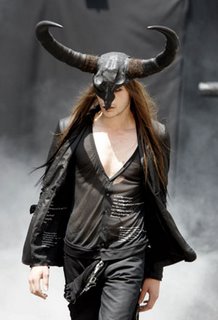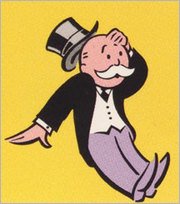Lets see last month we had the the satanic panic about the birth of the anti-christ on 06/06/06 .

He apparently made an appearance at the end of the month at the fashion walkways in Milan. No not the anti-christ but the Great God Pan. Who did not die contrary to the wish of his Christian detractors
The Gods of old are silent on their shore,
Since the great Pan expired, and through the roar
Of the Ionian waters broke a dread
Voice which proclaimed "the Mighty Pan is dead."
How much died with him ! false or true --- the dream
Was beautiful which peopled every stream
With more than finny tenants, and adorned
The woods and waters with coy nymphs that scorned
Pursuing Deities, or in the embrace
Of gods brought forth the high heroic race
Whose names are on the hills and o'er the seas.
Aristomenes -- by Lord Byron
The return of the horned god and the rebirth of paganism in the public meme of pop culture.
Art reflects and resolves the eternal human dilemma of order versus energy. In the west, Apollo and Dionysus strive for victory. Apollo makes the boundary lines that are civilization but that lead to convention, constraint, oppression. Dionysus is energy unbound, mad, callous, destructive, wasteful. Apollo is law, history, tradition, the dignity and safety of custom and form. Dionysys in the new, exhilarating but rude, sweeping all away to begin again. Apollo is a tyrant, Dionysus a vandal. Every excess breeds its counterreaction. So western culture swings from point to point on its complex cycle, pouring forth its lavish tributes of art, word and deed. We have littered the world with grandiose achievements. Our story is vast, lurid, and unending. (Sexual Personae, pp. 96-7) Apollo, Dionysus and Camille
The return of the repressed, as it began with the advent of the modernist era of last century, a century that saw the rebirth of magick.
Pan being the conciousness of liberty is the inspiration of libertines and libertarians. In ancient times they used to say that those who had lifted the veil of physical phenomena had seen the great god Pan. The upheavals of our time that have revealed a solution of continuity in the evolution of mankind have given rise to a panic literature. Dada is without doubt a pessimistic movement. But its pessimism is based on the danger of human ambitions. It is in de la Rochefoucald and Schopenhauer that we must search for the preliminaries to an international agreement. Dada is the only possible link between men since its fundamental principle consists in being right about nothing. Not to know Dada is not to know our time. In a century when Lenin falls after Wilson, Dada has nothing that can surprise us. Dadas are deliberately out of their depth. But if they are fools they are not stupid. They say nothing for a laugh and take nothing seriously.Art As Anarchy
Picasso never lost his sense of art as "magical," that is, a defense against inner and outer reality, and, more crucially, a way of influencing or controlling, and even changing, them, that is, modifying the reality of one’s internal objects -- the spirits within oneself -- and of external objects, which have their own spirits. This is sheer fantasy -- hence what I call fantastic realism, for it involves both the defense of fantasy and what Freud called "omnipotence of thought," the magical thinking that is characteristic of childhood. It survives in art, as he said -- especially in modern magical/fantastic art, of which Picasso’s is an extreme example, especially his Surrealist-inspired work of the ‘30s. As Charles Brenner writes, the child assumes that "all the objects" in its "environment. . . have thoughts, feelings and wishes just as he himself does. All nature is animate until experience, and his parents, tell him otherwise."(3) When Picasso said that "I use things as my passions tell me"(4) he shows his reluctance -- inability? -- to give up childhood thinking. It seems particularly evident in the still lives that proliferate throughout his art, from Guitar on a Table (1915) through Mandolin and Guitar (1924) to Still Life with Horned God (1937), and beyond. The objects in these pictures, whether natural or man-made, not only seem to be alive, but to have an inner life, that is, to be tense with inner drama.
And the goat-gods like Pan have their origin in the working and lower classes.
Momus. This is really most gratifying. Such encouragement is 4 precisely what I should have expected of a king of your exalted spirit; I will mention the name. I refer, in fact, to Dionysus. Although the mother of this truly estimable demi-god was not only a mortal, but a barbarian, and his maternal grandfather a tradesman in Phoenicia, one Cadmus, it was thought necessary to confer immortality upon him. With his own conduct since that time, I am not concerned; I shall have nothing to say on the subject of his snood, his inebriety, or his manner of walking. You may all see him for yourselves: an effeminate, half-witted creature, reeking of strong liquor from the early hours of the day. But we are indebted to him for the presence of a whole tribe of his followers, whom he has introduced into our midst under the title of Gods. Such are Pan, Silenus, and the Satyrs; coarse persons, of frisky tendencies and eccentric appearance, drawn chiefly from the goat-herd class. The first-mentioned of these, besides being horned, has the hind-quarters of a goat, and his enormous beard is not unlike that of the same animal. Silenus is an old man with a bald head and a snub nose, who is generally to be seen riding on a donkey; he is of Lydian extraction. The Satyrs are Phrygians; they too are bald, and have pointed ears, and sprouting horns, like those of young kids. When I add that every one of these persons is provided with a tail, you will realize the extent of our obligation.Works of Lucian, Vol. IV: The Gods in Council

Pan(Greek, Roman):Io Pan, the shout in the hills,
Io Pan, the hooves on the rocks,
Io Pan the song in the wild:
Io Pan, Io Pan.
Io Pan, the scattering of the flocks,
Io Pan, the singing of the pipes,
Io Pan, the roaring in the fields:
Io Pan, Io Pan.
Io Pan, the goat,
Io Pan, the man,
Io Pan, the god:
Io Pan, Io Pan.
Song by Aphra Behn
Pan, grant that I may never prove
So great a Slave to fall in love,
And to an Unknown Deity
Resign my happy Liberty:
I love to see the Amorous Swains
...Unto my Scorn their Hearts resign;
With Pride I see the Meads and Plains
...Throng'd all with Slaves, and they all mine:
Whilst I the whining Fools despise,
That pay their Homage to my Eyes.
| SING his praises that doth keep
Our flocks from harm.
Pan, the father of our sheep;
And arm in arm
Tread we softly in a round,
Whilst the hollow neighbouring ground
Fills the music with her sound.
Pan, O great god Pan, to thee
Thus do we sing!
Thou who keep'st us chaste and free
As the young spring:
Ever be thy honour spoke
From that place the morn is broke
To that place day doth unyoke!
John Fletcher |
Hymn Of Pan
From the forests and highlands
We come, we come;
From the river-girt islands,
Where loud waves are dumb,
Listening to my sweet pipings.
The wind in the reeds and the rushes,
The bees on the bells of thyme,
The birds on the myrtle bushes,
The cicale above in the lime,
And the lizards below in the grass,
Were as silent as ever old Tmolus was,
Listening to my sweet pipings.
Liquid Peneus was flowing,
And all dark Tempe lay
In Pelion’s shadow, outgrowing
The light of the dying day,
Speeded by my sweet pipings.
The Sileni and Sylvans and Fauns,
And the Nymphs of the woods and waves,
To the edge of the moist river-lawns,
And the brink of the dewy caves,
And all that did then attend and follow,
Were silent with love, as you now, Apollo,
With envy of my sweet pipings.
I sang of the dancing stars,
I sang of the dædal earth,
And of heaven, and the giant wars,
And love, and death, and birth.
And then I changed my pipings—
Singing how down the vale of Mænalus
I pursued a maiden, and clasp’d a reed:
Gods and men, we are all deluded thus!
It breaks in our bosom, and then we bleed.
All wept—as I think both ye now would,
If envy or age had not frozen your blood—
At the sorrow of my sweet pipings.
Thoreau's Flute
by Louisa May Alcott (written after Thoreau's death) We sighing said, "Our Pan is dead;
His pipe hangs mute beside the river
Around it wistful sunbeams quiver,
But Music's airy voice is fled.
Spring mourns as for untimely frost;
The bluebird chants a requiem;
The willow-blossom waits for him;
The Genius of the wood is lost."
Then from the flute, untouched by hands,
There came a low, harmonious breath:
"For such as he there is no death;
His life the eternal life commands;
Above man's aims his nature rose.
The wisdom of a just content
Made one small spot a continent
And tuned to poetry life's prose.
"Haunting the hills, the stream, the wild,
Swallow and aster, lake and pine,
To him grew human or divine,
Fit mates for this large-hearted child.
Such homage Nature ne'er forgets,
And yearly on the coverlid
'Neath which her darling lieth hid
Will write his name in violets.
"To him no vain regrets belong
Whose soul, that finer instrument,
Gave to the world no poor lament,
But wood-notes ever sweet and strong.
O lonely friend! he still will be
A potent presence, though unseen,
Steadfast, sagacious, and serene;
Seek not for him -- he is with thee."
(Henry's flute is on display in the Concord Museum. It's made of
fruitwood, a warm reddish-brown wood. It has metal stops on it, and
Henry's and his father's names carved into it - Amy Belding Brown)
 goat-foot God of Arcady!
goat-foot God of Arcady!
This modern world is grey and old,
And what remains to us of thee?
No more the shepherd lads in glee
Throw apples at thy wattled fold,
O goat-foot God of Arcady!
Nor through the laurels can one see
Thy soft brown limbs, thy beard of gold,
And what remains to us of thee?
And dull and dead our Thames would be,
For here the winds are chill and cold,
O goat-foot God of Arcady!
Then keep the tomb of Helice,
Thine olive-woods, thy vine-clad wold,
And what remains to us of thee?
Though many an unsung elegy
Sleeps in the reeds our rivers hold,
O goat-foot God of Arcady!
Ah, what remains to us of thee?
II
Ah, leave the hills of Arcady,
Thy satyrs and their wanton play,
This modern world hath need of thee.
No nymph or Faun indeed have we,
For Faun and nymph are old and grey,
Ah, leave the hills of Arcady!
This is the land where liberty
Lit grave-browed Milton on his way,
This modern world hath need of thee!
A land of ancient chivalry
Where gentle Sidney saw the day,
Ah, leave the hills of Arcady!
This fierce sea-lion of the sea,
This England lacks some stronger lay,
This modern world hath need of thee!
Then blow some trumpet loud and free,
And give thine oaten pipe away,
Ah, leave the hills of Arcady!
This modern world hath need of thee!
Pan With Us
Robert Lee Frost
Pan came out of the woods one day,--
His skin and his hair and his eyes were gray,
The gray of the moss of walls were they,--
And stood in the sun and looked his fill
At wooded valley and wooded hill.
He stood in the zephyr, pipes in hand,
On a height of naked pasture land;
In all the country he did command
He saw no smoke and he saw no roof.
That was well! and he stamped a hoof.
His heart knew peace, for none came here
To this lean feeding save once a year
Someone to salt the half-wild steer,
Or homespun children with clicking pails
Who see so little they tell no tales.
He tossed his pipes, too hard to teach
A new-world song, far out of reach,
For sylvan sign that the blue jay's screech
And the whimper of hawks beside the sun
Were music enough for him, for one.
Times were changed from what they were:
Such pipes kept less of power to stir
The fruited bough of the juniper
And the fragile bluets clustered there
Than the merest aimless breath of air.
They were pipes of pagan mirth,
And the world had found new terms of worth.
He laid him down on the sun-burned earth
And raveled a flower and looked away--
Play? Play?--What should he play?

490 BCE To punish mainland Greeks for their support of the rebellion in Asia Minor, Darius the Great of Persia sends a fleet across the Aegean Sea and lands soldiers near
Marathon, twenty-six miles north of Athens. A runner covers the distance to announce the arrival of the Persians. A coalition of city-states defeats the Persians at Marathon, and the Persians withdraw. In Athens, the god Pan is said to have given the Greeks their victory, to win back from the Athenians their devotion, which he had seen as diminishing.
Soon it was said that the god Pan had given the Athenians their victory by his causing panic among the Persians. It was said that Pan had done so after having seen a slack in devotion to him among the Athenians, Pan wanting to regain their devotion - a tactic different from Yahweh's reaction to the lack of devotion he had found among his Hebrews, and one that apparently worked better.
The Original of Religions by Sir Isaac NewtonMars is sometimes called Mars Silvanus & thence Silvanus or Silenus is the same God with Mars or Bacchus for both were drunkards, & Pausanias tells us the oldest Satyrs were called Sileni, & Diodorus that Silenus was the first king of Nysa where Bacchus was born & that they were contemporary. Whence it follows that they were originally the same person though afterwards the two names became split into two persons, & the one made the Tutor & companion of the other. Another name of this God was Pan or (as the Latines called him) Faunus. For Pan was a sheepherd & painted like a Satyr & by consequence he was an Arabian. The
p 
Note: p Phurnutus de nat. Deor. in Baccho')" Goat was sacred to Bacchus & satyrs were his perpetual companions & the ancients used to paint the Gods in the form of such animals as were sacred to them. Dionysus saith
pPhurnutus, was delighted with the sacrifice of Goates
δια το ’εαυτον ’ειναι τον τραγον because he himselfe was a Goat. He was
h 
Note: h Herod. l. 2') one of the 8 first Egyptian Gods, lived
i 
Note: i Diodor. l. 1. p. 16.a.')" with them in Ægypt in the days of Osyris & in their war with the Giants was among them & was then so terrible to their enemies that he is ever since accounted the author of terror & Panicus terror is still a Proverb:
 d
d 
Note: d Apud Anonymum de incredibilibus Fab. 11.')" Polienus commemorates that Pan first found out military order & constituted the right wing & the left (whence his effigies was formed with horns, & that he was the first that by wisdome & art cast terror. He was
k 
Note: k Epiimenides Aristippus & alij apud Natalem Comitem l. 5. c. 6.') the son of Iupiter &
l 
Note: l Theocritus in Phurnutus de nat. Deor. in Paus Thyrside') addicted to hunting, & carried in his hand a siccle which he used in pruning vines. All which characters can agree to none but Chus the God of wine & war. He was worshipped in Egypt by none but the Mendesij, a people of the lower Egypt where the Arabian Sheepherds sometimes reigned.
Commentary on Bacon's Wisdom of the Ancients& Lord Bacon's Interpretation of Mythsby Manly P. HallWisdom of its own nature being the principle incorruptible, the relationship of knowledge and learning to wisdom becomes important. Knowledge and learning are expressions of the ascent of human intelligence rising along the steps of what Bacon called his "Pyramid of Pan." Knowledge is like the rungs of a ladder upon which men climb. It is also a road with many paths as in the table of Thebes in which persons of every walk of life, every degree of intelligence, every type of conviction are groping along;always in search of that which is better. They are constantly striving toward wisdom. Their strivings are forever changing.
Bacon, being somewhat of a scientist, liked to point out that the strivings of science are forever changing. One day w have one belief, the next day another. One scientist supports another, a third contradicts them both. Yet each one ina way is dedicated to truth, but to each truth is only what he is capable of experiencing. Therefore, Bacon points out that the greatest handicap to the advancement of learning is the human mind. Here he comes very close to the concepts of Buddha. He points out that as long as the individual is in captivity to the tryranny of mind, mind will hold him to the conditions with which it is familiar. The biologist will continue to grope along the lines of biology, the physicist along the lines of physics, the astronomer will continue to build larger lenses with which to view the heavens; but all these are not going to end directly in wisdom.
Shaftesbury’s Characteristics of Men, Manners, Opinions, Times was first published in 1711. It ranges widely over ethics, aesthetics, religion, the arts (painting, literature, architecture, gardening), and ancient and modern history, and aims at nothing less than a new ideal of the gentleman. Together with Locke’s Essay Concerning Human Understanding and Addison and Steele’s Spectator, it is a text of fundamental importance for understanding the thought and culture of Enlightenment Europe. This volume presents a new edition of the text together with an introduction, explanatory notes and a guide to further reading.
Midas, and other Folktales of Type 782Montesquieu, Temple of Gnidus: The Online Library of LibertyHume, The Natural History of Religion (1757) It was an age of reason based on faith, not an age of faith based on reason. The enlightenment spiritualized the principle of religious authority, humanized theological systems, and emancipated individuals from physical coercion. It was the Enlightenment, not the Reformation or the Renaissance that dislodged the ecclesiastical establishment from central control of cultural and intellectual life. by emancipating science from the trammels of theological tradition the Enlightenment rendered possible the autonomous evolution of modern culture. Diderot said, if you forbid me to speak on religion and government, I have nothing to say. Hence natural science occupied the front of the stage.
Most of the philosophes wrote on natural science. To Diderot, d'Holbach and the encyclopedists all religious dogma was absurd and obscure. LeMettrie and d'Holbach were consistent determinists. Voltaire disagreed with them and said they had a dogmatism of their own. Diderot too insisted on the free play of reason. But he was an unashamed pagan and believed in a kind of pantheism or pan-psychism, not pure atheism or materialism. He was humanistic, secular, modern and scientific. He expected from his method a regeneration of mankind.
English deism, however, was more pervasive in the Enlightenment. It emphasized an impersonal deity, natural religion and the common morality of all human beings. Deism was a logical outgrowth of scientific inquiry, rational faith in humanity, and the study of comparative religion. All religions could be reduced to worship God and a commonsense moral code. There was a universal natural religion.
Yet, it was David Hume, the Englishman, who cut the ground from under his deist friends (Natural History of Religion). Natural religion rested on the basic assumption that man is guided by the dictates of reason. Mind is the scene of the uniform play of motive. The motives of man are quantitatively and qualitatively the same at all times and in all places. An empirical study of the nature of man, said Hume, reveals not an identical set of motives but a confusion of impulses, not an orderly cosmos but chaos. The elemental passion, hopes and fears is the root of religious experience. Religions may be socially convenient but being rooted in sentiment they lack the validity of scientific generalization. A rational religion is a contradiction in terms. Hume here comes close to demolishing the entire rationalist philosophy of the Enlightenment--its natural rights, its self-evident truths and its universal and immutable laws of morality.
Voltaire is in the middle between the materialism of the Encyclopedists and the skepticism of Hume. His ruthless and comic deflation of theological sophism prevented him from recognizing the deepest drives of Catholicism. He conveyed the power of intellect to his generation, but also saw the limitations of reason. Reason was, after all, a poor instrument, but it was the only weapon that raised man above the animals. He believed in the argument from design or "first cause." But this no longer sufficed Diderot and Hume. Voltaire accepted the classical ideal of the brotherhood of man and the universal morality of man. He was essentially a humanist--the greatest humanist of the Enlightenment. He had not the depth of David Hume or Immanuel Kant, but they could not have done his work. Voltaire had only one absolute value: the human race.
The central theme of the Enlightenment is the effort to humanize religion. All philosophes rejected original sin. Here Pascal became a problem for them. For Pascal used their method of analytic logic to prove the existence of original sin and the utter inability of the unaided human reason o solve the problem without accepting the authority of faith. How do you explain the "double nature" of mankind? It becomes intelligible only through the doctrine of the fall of man. Pascal haunted Voltaire all his life. The cruel laughter of the Candide could not suppress the problem of evil. In the upshot he accepted Pascal's analysis of human nature. By becoming an agnostic he became prisoner of Pascal's argument--reason without faith ends in skepticism.
Rousseau had a more original solution to Pascal's problem. In his two discourses he painted a picture of depravity of society that would have delighted Pascal. If he accepted degeneration how was he to explain radical evil? He discovered a new agent of degeneration--the "fall of man"--not god or individual man but society. Thus salvation comes through the social contract. Man must save himself. In social justice is the meaning of life. It was neither a theological or metaphysical solution but a modern solution.
GK CHESTERTON: THE EVERLASTING MANThe idea was concealed, was avoided was almost forgotten, was even explained away; but it was never evolved. There are not a few indications of this change in other places. It is implied for instance in the fact that even polytheism seems often the combination of several monotheisms. A god will gain only a minor seat on Mount Olympus, when he had owned earth and heaven and all the stars while he lived in his own little valley. Like many a small nation melting in a great empire, he gives up local universality only to come under universal limitation. The very name of Pan suggests that he became a god of the wood when he had been a god of the world. The very name of Jupiter is almost a pagan translation of the words 'Our Father which art in heaven.' As with the Great Father symbolized by the sky, so with the Great Mother whom we still call Mother Earth. Demeter and Ceres and Cybele often seem to be almost incapable of taking over the whole business of godhood, so that men should need no other gods. It seems reasonably probable that a good many men did have no other gods but one of these, worshipped as the author of all.
PoetrySyrinx, by John LylyRPO -- William Wilfred Campbell : Pan the Fallen32. Endymion. Keats, John. 1884. The Poetical Works of John KeatsSolitude -- from Walden by Henry Thoreau, with notes and analysisRPO -- Algernon Charles Swinburne : Atalanta in CalydonLa Muse malade by Charles Baudelaire'Pan and Luna' :: A poem by Robert Browning :: PoetryConnection.netA Musical Instrument by Elizabeth Barrett BrowningAleister Crowley 'Hymn To Pan'Aleister Crowley 'Pan to Artemis'
Other References
Folklore: Pan
Chapter 43. Dionysus.The Golden Bough
Golden Bough Chapter 49. Ancient Deities of Vegetation as Animals ...
God of the Witches by Margret Murray
The Temple of Solomon the King
The Goat Foot God and Dion FortuneWitchcraft Today By Gerald B. GardnerPan (mythology) - Wikipedia, the free encyclopediaCapricorn the Goat" On the Destiny of the Soul" by FS DarrowJSTOR: The Survival of PanMany sculptures in Manhattan are linked to important dates in U.S. or world history. Here are a few for May; Time to Panic
Carnival Carnaval Mardi Gras Bacchanalia LupercaliaBacchus Autobiography of a Demi-godDionysian Mysteries - Wikipedia, the free encyclopediaKarl Marx and Human Self-Creation | libcom.org libraryA Time of Reconquest: History, the Maya Revival, and the Zapatista Rebellion in ChiapasFind blog posts, photos, events and more off-site about:
horned-god, milan, fashion, haute, coutier, pagan, paganism, pan, satan, anti-christ, 666





